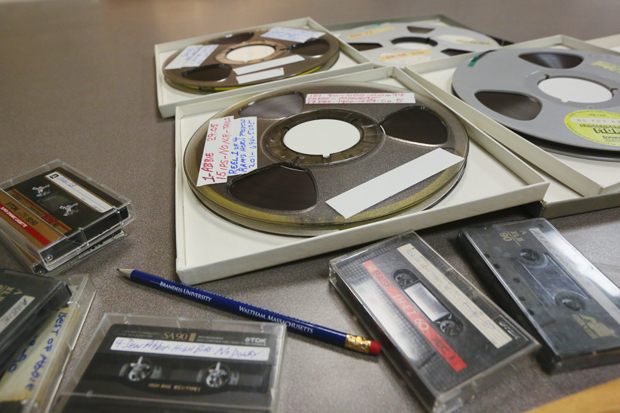Don't steal these tapes: Interviews with Abbie Hoffman '59 donated to Brandeis
 Photo/Mike Lovett
Photo/Mike LovettA few of the tapes from the Stuart Hutchison Collection.
An actor, writer and radio broadcaster, Hutchison had developed close relationships with celebrities and activists, and recorded interviews with many of them in the 1980s. Snippets from these audio recordings made their way into “Dear Abbie,” a radio special Hutchison put together after Hoffman’s suicide in 1989. Much of the material, however, was likely never broadcast.
After Hutchison died, the recordings went to Keith Armonaitis, a New Jersey filmmaker who befriended Hutchison when both were involved in a campaign to impeach President George W. Bush. After listening to the tapes, Armonaitis decided to give them to Brandeis.
Armonaitis doesn’t have any connection to the university. Neither did Hutchison. So, why Brandeis?
According to Armonaitis, in one recorded interview Hoffman tells Hutchison he wants his written and personal materials to go to Brandeis when he dies, because the university gave him the educational foundation that led to his activism in the ’60s and ’70s.
“When I heard that, I knew the tapes had to come to Brandeis,” Armonaitis said.
The tapes arrived at the Robert D. Farber University Archives and Special Collections last year as the Stuart Hutchison Collection. Staff members are in the process of finding out what’s on them and making them available to the public. The tapes’ labels include, along with some familiar names, shorthand notations that make their contents unclear.
“It’s an interesting collection, and it is a little mysterious,” said university archivist Maggie McNeely.
To preserve their sound quality, the tapes are being converted into a digital format before the archivists listen to them and create an inventory. The recordings believed to be most directly related to Hoffman are being digitized first. These include interviews with people like Vonnegut, Howard Zinn and Pete Seeger.
They also include about 14 hours of one-on-one interviews between Hutchison and Hoffman, probably recorded within months of Hoffman’s death.
“They were good friends,” McNeely said, “so these are very intimate, casual interviews, and they touch on many subjects,” potentially making the recordings very interesting to people interested in Hoffman or the ’60s/’70s counterculture.
In July, the library posted on its website an audio clip of Vonnegut discussing Hoffman. The goal is to eventually make all the recordings available for streaming online.
Previously, the archives had only a few items related to Hoffman. “We often get asked about what we have on Abbie Hoffman, and unfortunately it is very little,” McNeely said. “We think what we have with these interviews is quite rich. There are still a lot of unanswered questions, but it is very exciting.”
Armonaitis hopes the tapes will revive Hoffman’s legacy. “I’m not keeping them to myself, because I think they are too important,” he said. “They need to be heard, and that won’t happen if they are sitting in a box in my house.
“Maybe people who listen will gain some wisdom. Maybe they will bring Abbie’s memory into the minds of people in college now.”
Categories: Alumni, Research, Student Life





